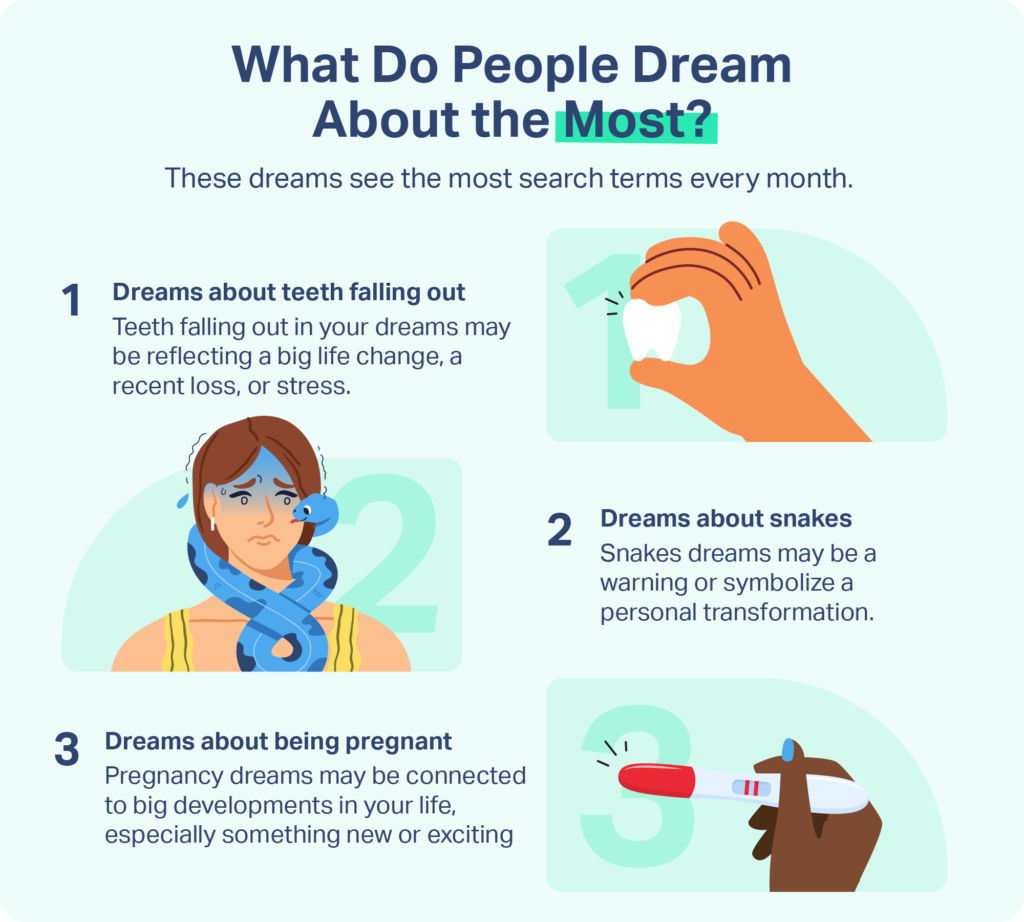Why You Keep Having Recurring Dreams
Research suggests that up to 75% of adults experience recurring dreams . Recurring dreams can involve disturbing content, so people who have them may be curious about why they occur and what they mean. We explore what recurring dreams mean, common recurring dream scenarios, and ways to stop having recurring dreams.
Is Your Troubled Sleep a Health Risk?
A variety of issues can cause problems sleeping. Answer three questions to understand if it’s a concern you should worry about.
What Do Recurring Dreams Mean?
Experts from a wide variety of backgrounds believe that recurring dreams result from unresolved life problems or difficult emotions . Recurring dreams may allow the mind to make sense of past painful experiences, or they may provide a sort of practice scenario so that the dreamer can rehearse their reaction to a threat. Recurring dreams may also prompt a person to face and process a problem in their life.
Another related possible meaning of a recurring dream is that it represents an unmet psychological need. Experts consider that the three basic psychological needs are the need to feel independent, the need to feel competent, and the need to feel connected to others. Some research has found that people with unmet psychological needs are more likely to have recurring dreams with negative themes, like failing, falling, or being attacked.
The situations and environments related to unmet psychological needs may impact recurring dreams more than the unmet needs themselves. For example, a person may be capable of processing emotions surrounding an unmet need, such as loneliness, but not face the broader context of what led to that emotion, such as being rejected by a close friend. These feelings might be more difficult to address during waking hours, and the avoidance could lead to recurring dreams.
While there are many theories on dream interpretation, it’s very difficult to test these theories in a scientific context since it’s normally impossible to communicate with someone while they dream. That said, some people may find recurring dreams provide them with insight into recent events or life changes. Dream journaling and Jungian analysis are examples of practices that can make use of dreams in these ways.
The Most Common Recurring Dreams
Although individual people have their own unique recurring dreams, certain themes and happenings have been found to commonly occur across much of the population. The majority of recurring dreams are viewed as unpleasant, while, less commonly, recurring dreams are considered mundane or non-threatening. Common recurring dream themes include:
- Flying
- Falling
- Being frozen with fear or locked up
- Fire
- Being late
- Being chased
- Hiding
- Being alone and stuck, trapped, or smothered
- Facing volcanos, tidal waves, or other natural forces
- Encountering a person who has died in real life
- Failing a test
- Having teeth fall out
- Being nude or inappropriately dressed
- Experiencing misfortune
- Struggling with home maintenance or finding previously unknown rooms in a house
- Excelling at a task
- Having sex

What Recurring Dreams Do Children Have?
Like adults, children also experience recurring dreams. Up to 90% of recurring dreams experienced by children are considered unpleasant and involve a threat. In many cases, the dreams involve fantastical or unrealistic content. As children grow, their dreams start to focus more on threats from strangers as opposed to monsters.
Common recurring dream themes in children and teens include:
- Being chased
- Facing animals, witches, ghosts, or monsters
- Being physically attacked or kidnapped
- Falling
- Interacting with strangers
- Becoming physically stuck or trapped
- Getting in a car crash
- Experiencing misfortune
- Becoming sick or developing a disease
- Dying
- Experiencing the death of a parent or family member
- Positive themes such as engaging in fun activities
- Losing control over the body

Research has found some links between aggressiveness, problems with social adjustment, and recurring dreams among children . More research is needed to understand the causes and effects of recurring dreams in children and adolescents.
What If I Have Recurring Nightmares?
Although recurring dreams often feel negative in nature, they aren’t always considered nightmares. To be classified as a nightmare, a bad dream must wake a person up from sleep and be vividly remembered . When a person wakes up from a nightmare, they often feel panicked or afraid, are sweating, and have an increased heart rate.
Nightmares often share themes with recurring dreams. Common nightmare themes are being chased, facing illness or death, experiencing failure, having an accident of some sort, and experiencing interpersonal conflict or physical aggression.
When a person has recurring nightmares, they may have nightmare disorder. Nightmare disorder involves nightmares occurring frequently enough to negatively impact a person’s ability to sleep well or their daytime functioning. When a person has nightmare disorder, their nightmares may disturb their mood, disrupt sleep and cause daytime tiredness, or even lead to a fear of going to sleep and having another nightmare.
How to Stop Recurring Dreams
If recurring dreams feel bothersome, there may be ways to reduce or stop them.
- Resolve related problems or needs: If you can identify what emotional problems or trauma your recurring dreams stem from, then you might be able to stop them.
- Try therapy: Experts often recommend a particular branch of therapy called imagery rehearsal therapy to treat recurring nightmares. Under the guidance of a qualified therapist, this method involves working through the nightmare and reimagining the plot with a more positive ending.
- Reduce stress: Negative recurring dreams are often thought to result from stress. While more research is needed, it could be that reducing stress will in turn reduce negative recurring dreams.
- Address mental health: Recurring negative dreams occur more often in people with poor mental health. Treating conditions such as depression may help ward off bad dreams.
- Practice healthy sleep habits: Healthy sleep habits are often recommended to reduce the frequency of recurring nightmares. To practice healthy sleep habits, go to bed and wake up at the same time every day. Avoid caffeine, alcohol, nicotine, and fatty foods in the hours before sleep. Similarly, avoid digital devices near bedtime and opt instead for a relaxing screen-free bedtime routine.
- Diagnosis and treatment of sleep disorders: Some sleep disorders have been connected to greater frequency of negative dreams or nightmares. If you have a condition like insomnia, sleep apnea, or narcolepsy, then treatment would likely be helpful in reducing negative recurring dreams.
- Change medications: Some medications, including melatonin, are known to cause nightmares. A doctor can advise on lowering the dose or stopping the medication altogether, which will usually stop the nightmares.

Still have questions? Ask our community!
Join our Sleep Care Community — a trusted hub of product specialists, sleep health professionals, and people just like you. Whether you’re searching for the perfect mattress or need expert sleep advice, we’ve got you covered. Get personalized guidance from the experts who know sleep best.
References
5 Sources
-
Gauchat A, Séguin JR, McSween-Cadieux E, Zadra A. The content of recurrent dreams in young adolescents. Conscious Cogn. 2015 Dec;37:103-11.
https://pubmed.ncbi.nlm.nih.gov/26366465/ -
Weinstein N, Campbell R, Vansteenkiste M. Linking psychological need experiences to daily and recurring dreams. Motiv Emot. 2018;42(1):50-63.
https://pubmed.ncbi.nlm.nih.gov/29391655/ -
Zadra, Antonio. Recurrent dreams: Their relation to life events.
https://www.researchgate.net/publication/232509978_Recurrent_dreams_Their_relation_to_life_events -
Gauchat A, Zadra A, Tremblay RE, Zelazo PD, Séguin JR. Recurrent Dreams and Psychosocial Adjustment in Preteenaged Children. Dreaming. 2009 Jun 1;19(2):75-84.
https://pubmed.ncbi.nlm.nih.gov/24976740/ -
Zak, R., & Karippot, A. (2023, October 18). Nightmare and nightmare disorder in adults. UpToDate.
https://www.uptodate.com/contents/nightmares-and-nightmare-disorder-in-adults


















